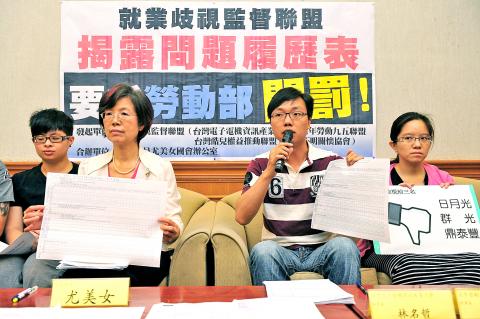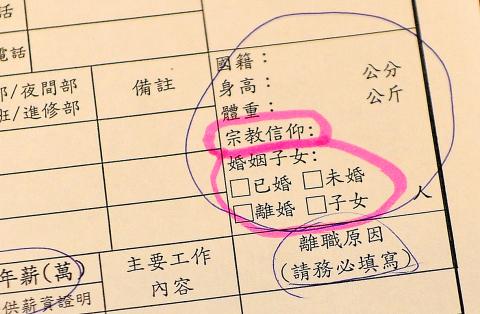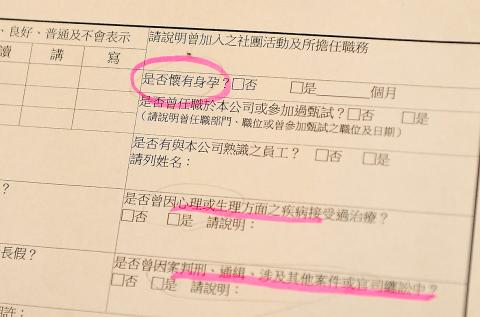Employers were yesterday condemned for seeking what rights activists called irrelevant information from jobseekers, such as their sexual orientation, marital status, whether they are pregnant, their religion and even when a female job seeker has her period.
Accompanied by Democratic Progressive Party Legislator Yu Mei-nu (尤美女), activists held a news conference at the legislature in Taipei yesterday, accusing companies of discriminating against applicants based on their answers.
“This practice is highly inappropriate and is in violation of the Employment Services Act (就業服務法) and the Act of Gender Equality in Employment (性別工作平等法),” Yu said.

Photo: Chien Jung-fong, Taipei Times
“Regardless of their sexual orientation, gender, marital status or religion, these people are capable of work and if you deny them employment based on things that are irrelevant to the job, they may instead become welfare recipients,” she added.
Yu said she had collected job application forms from 34 companies, with most asking questions unrelated to the job.
Intersex, Transgender and Transsexual People Care Association president Abbygail Wu (吳伊婷) said that the group receives many complaints from transgender people, who say they are denied opportunities — and has herself been discriminated against several times.

Photo: Chien Jung-fong, Taipei Times
“There have been many times when I don’t know whether I should check ‘male’ or ‘female’ on the application form, so I leave it blank. The interviewer then asks why I have left it blank,” Wu said. “Why does gender matter for a convenience store cashier or a computer engineer?”
She said that there have been cases where job applicants may “look” different from the gender marked on their ID cards and have been asked whether they are male or female.
“There was one case when a job applicant who ‘looks’ like a woman, but was marked down as a man, was told by the interviewer that he should cut his hair before applying for the job,” Wu said.

Photo: Chien Jung-fong, Taipei Times
A lesbian who wished to be known by her nickname, Dou Dou (豆豆), said that when she applied for an internship at a hotel, she told the interviewer that she did not want to wear a skirt at work, the interviewer agreed, but asked her to use the men’s changing room since she wanted to wear pants.
“However, my supervisor was upset when he saw me in pants. He called a meeting, and said: ‘A man is a man, a woman is a woman, a man should wear pants, and a woman should wear skirts’ and ‘I don’t like gays who are neither man nor woman,’” Dou Dou said.
An official with the Ministry of Labor, Wang Ya-fen (王雅芬), said that asking irrelevant questions on a job application could be discrimination and in violation of the law.
“Anyone who runs into such questions should file a complaint with the local labor authorities, and they will take care of it,” Wang said. “Last year, 185 complaints were filed and 18 were confirmed to be cases of discrimination, with the employers fined.”

Chinese Nationalist Party (KMT) Chairman Eric Chu (朱立倫), spokeswoman Yang Chih-yu (楊智伃) and Legislator Hsieh Lung-chieh (謝龍介) would be summoned by police for questioning for leading an illegal assembly on Thursday evening last week, Minister of the Interior Liu Shyh-fang (劉世芳) said today. The three KMT officials led an assembly outside the Taipei City Prosecutors’ Office, a restricted area where public assembly is not allowed, protesting the questioning of several KMT staff and searches of KMT headquarters and offices in a recall petition forgery case. Chu, Yang and Hsieh are all suspected of contravening the Assembly and Parade Act (集會遊行法) by holding

PRAISE: Japanese visitor Takashi Kubota said the Taiwanese temple architecture images showcased in the AI Art Gallery were the most impressive displays he saw Taiwan does not have an official pavilion at the World Expo in Osaka, Japan, because of its diplomatic predicament, but the government-backed Tech World pavilion is drawing interest with its unique recreations of works by Taiwanese artists. The pavilion features an artificial intelligence (AI)-based art gallery showcasing works of famous Taiwanese artists from the Japanese colonial period using innovative technologies. Among its main simulated displays are Eastern gouache paintings by Chen Chin (陳進), Lin Yu-shan (林玉山) and Kuo Hsueh-hu (郭雪湖), who were the three young Taiwanese painters selected for the East Asian Painting exhibition in 1927. Gouache is a water-based

Taiwan would welcome the return of Honduras as a diplomatic ally if its next president decides to make such a move, Minister of Foreign Affairs Lin Chia-lung (林佳龍) said yesterday. “Of course, we would welcome Honduras if they want to restore diplomatic ties with Taiwan after their elections,” Lin said at a meeting of the legislature’s Foreign Affairs and National Defense Committee, when asked to comment on statements made by two of the three Honduran presidential candidates during the presidential campaign in the Central American country. Taiwan is paying close attention to the region as a whole in the wake of a

OFF-TARGET: More than 30,000 participants were expected to take part in the Games next month, but only 6,550 foreign and 19,400 Taiwanese athletes have registered Taipei city councilors yesterday blasted the organizers of next month’s World Masters Games over sudden timetable and venue changes, which they said have caused thousands of participants to back out of the international sporting event, among other organizational issues. They also cited visa delays and political interference by China as reasons many foreign athletes are requesting refunds for the event, to be held from May 17 to 30. Jointly organized by the Taipei and New Taipei City governments, the games have been rocked by numerous controversies since preparations began in 2020. Taipei City Councilor Lin Yen-feng (林延鳳) said yesterday that new measures by